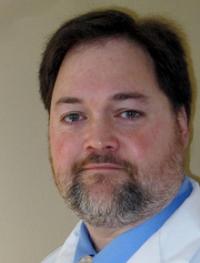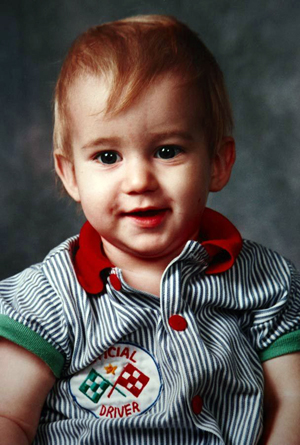Submitted on
 Welcome to another text installment of “10 Words or Less,” in which I ask brief questions of interesting people and request brief answers in return. (Previously, I posted the video of our chat; this is the edited transcript, for those who prefer text.) Today’s participant is a food-safety advocate and college instructor in regulatory affairs who formerly operated a nuclear reactor. (I can’t count how many of my friends can say that!) Please remember that “10 Words” is an ethic, not a rule, so please, no counting. If you think it’s easy, let’s see you do it.
Welcome to another text installment of “10 Words or Less,” in which I ask brief questions of interesting people and request brief answers in return. (Previously, I posted the video of our chat; this is the edited transcript, for those who prefer text.) Today’s participant is a food-safety advocate and college instructor in regulatory affairs who formerly operated a nuclear reactor. (I can’t count how many of my friends can say that!) Please remember that “10 Words” is an ethic, not a rule, so please, no counting. If you think it’s easy, let’s see you do it.
Name Darin Detwiler (right)
Born when, where May 19, 1968, San Francisco
Resides "Salem, Mass., known for the Salem Witch Trials, which are allegedly tied to food-borne illness, as the source of the deliria that was perceived as witchcraft."
Job "I have two jobs: Adjunct professor at Northeastern University, where I teach in regulatory affairs of food and food industry. Also, I’m the senior policy coordinator at Stop Foodborne Illness, a national nonprofit that supports victims and their families."
What you wanted to be when you grew up "Actually, two things. I wanted to be a musician, and I wanted to be a seismologist. I really wanted to shake, rattle, and roll."
Your first paying job "When I was in high school, I played a Santa Claus at a mall. [Pause.] It wasn’t that paying."
Wisdom you retain from that experience "Never say to a kid, or ask a kid, about their parents, Mom or Dad. Always say ‘folks,’ because folks is generic, and can apply to adopted or grandparents or foster parents. We go through life thinking everyone had to fit into a cookie cutter, but there are many children who have different family situations."
Your family composition today "I have adult sons. My youngest son just started university. I live with my girlfriend. And we have a cat." Tell me about Riley "Riley was born when I was in the Navy. I operated a nuclear reactor on a submarine. This was the late '80s. He was born in Hawaii and I felt guilty being away at sea so much. I got out of the Navy when he was a year old, and thought I would have a lifetime of being able to make up my absence as his father from that point on."
Tell me about Riley "Riley was born when I was in the Navy. I operated a nuclear reactor on a submarine. This was the late '80s. He was born in Hawaii and I felt guilty being away at sea so much. I got out of the Navy when he was a year old, and thought I would have a lifetime of being able to make up my absence as his father from that point on."
What happened? "I was living north of Seattle. He was in daycare a few days a week while I was trying to get a job after getting out of the service. He became a victim of 1993 Jack in the Box E. coli outbreak, which caused the illness of 650 people and took the lives of four young children, including my son.”
A way in which that experience changed you "My entire life. The time between his getting sick and when he died was only 1 month. He died from hemolytic uremic syndrome, which is the worst-case illness from E. coli. I still have burned in my mind his last steps, his last words. I remember clipping the newspaper articles and thinking he would eventually be old enough to understand what had happened to him. I had no idea he was going to pass away from this.
"The death bed is a horrible place to learn about food safety, and about the responsibilities that people have within society to make sure that people are safe with food. Today I see images of him on the news or on videos of news reports, but that doesn’t take away those memories of seeing his face and smelling his little boy hair and hearing his last words and holding him for the very last time."
What’s it’s like to be in the media spotlight? "At first, the media was hungry for news. They weren’t getting info from the health department, which had its hands tied by industry; they weren’t allowed to release certain information. So the media wanted to put a face on the story.
"Also, at first, they were saying the outbreak was over, and yet, people can get sick from other people. It’s not just eating the product. It’s coming into contact with people who ate it, might be sick, but not really appear to be really sick. You must have experienced it when you said, ‘'It must be something I ate. My stomach feels off.’ You could be sick with a food-borne pathogen but as a healthy adult be able to take care of that.
"But we can pass it on to another person if we’re not washing our hands properly, things of that nature. Then people who are young, or older, or have a compromised immune system are not able to handle the pathogen. So trying to tell them they had the story wrong, that more people were getting sick, resulted in more coverage. I talked to President Clinton right after he took office, in a 1993 live televised town meeting. I ended up on ‘The Phil Donahue Show.’ Then Riley passed away, and there was media attention surrounding that."
What’s your favorite meal "I’m a sucker for pizza."
Do you eat fast food? "I can’t say I’ve never eaten fast food in the last 21 years. I guarantee I don’t eat hamburgers. I don’t eat very much beef at all. I definitely don’t eat ground beef. I definitely don’t eat at Jack in the Box. … My son had never eaten a hamburger in his life."
This was his first one? "No, he never ate a hamburger in his life. He got sick from another child in his daycare. In fact, ask me that question, how he got sick. "
OK, how did he get sick? "At his daycare, he came into contact with another kid, who *was* sick with E. coli. Now here’s where the story gets tragic, if it wasn’t tragic enough already. This other kid, and I have no ill will against this young child, his mother fed him the hamburger that got him sick. What’s of note is that his mother was assistant manager at Jack in the Box. His father was a shift supervisor at Jack in the Box. She cooked it to a temperature below the state-regulated temperature. She cooked a hamburger for herself and for her 18-month-old son. They both got sick, they went to the doctor. but the test took 48 hours to come back with the results. During that time, guess what she did. … she put her child into daycare, not telling them that he was sick with E. coli, so she could go back to flipping burgers while sick herself with E. coli at the Jack in the Box.
"So when we talk about paid sick leave, when we talk about a thing like hand-washing, when we talk about putting a child into school or daycare if they’re sick, there are consequences. And unfortunately, my son Riley, at 16 months of age, was a casualty of those consequences.”
What don’t people understand? "That food-borne illness is still a ‘thing.' They may read about it in the news. They may think about that was there or that was then, but 1 in 6 Americans every year get sick from food-borne illness. Approximately 130,000 Americans every year, on average, end up in the hospital because of food-borne pathogens. And this is what’s really scary: Estimated numbers are that 8 people in America die every day due to food-borne illness."
An impediment to change “Education. When I talk with the industry, they assume that public schools teach about food safety and hand washing to kids. That’s not true. The industry assumes that things are done in the home, but that’s necessarily true everywhere. There are also assumptions from consumers and families, that food-service employees are trained, and inspected, and observed, and managed, in terms of food safety, and that’s not necessarily true. There are certifications — ServSafe is a very important certification for those in the food industry — but not every person is ServSafe certified."
A common threat we face "People making decisions based on inadequate knowledge."
Will we overcome it? "Probably not. Therefore, I think we need to go forth thinking that the best person to be responsible for us and for our families is ourselves. If we continue to put blind faith in others, then we will find ourselves sorely mistaken."
What’s the one thing you wish everyone would just get right? “Believing in themselves, that they have value and can make a difference and not only can be, but are, important role models in other people’s lives, They may not know it, but they are.”
- Michael's blog
- Log in to post comments